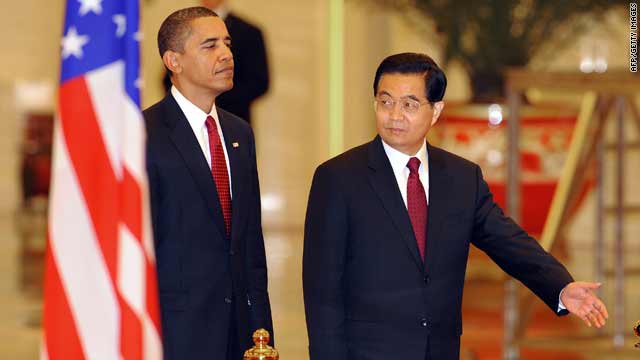Obama, Hu to talk economy, North Korea

- NEW: Obama to hold formal talks with Chinese President Hu Jintao in Beijing
- NEW: New U.S. poll shows split on whether Chinese pose military threat
- Obama tells students free flow of info a source of strength, despite sting
- United States imports billions of dollars in Chinese products each year
Beijing, China (CNN) -- Chinese President Hu Jintao greeted U.S. President Barack Obama in China's capital on Tuesday, with trade and the thorny issue of North Korea expected to be on their agenda.
The U.S. delegation was met by an honor guard at the Great Hall of the People, and Obama shook hands with Hu and other top Chinese officials before the two leaders went behind closed doors. It is their fifth meeting in the past year, and they made no public statements beforehand but are to issue a joint statement after their talks.
The United States imports billions of dollars in Chinese products each year, while China is a major purchaser of the U.S. Treasury bonds that finance America's budget deficit. Facing a global economic recession, Washington and Beijing are in "a mutual hostage situation," former Bush administration China analyst Victor Cha said.
"China needs to purchase these Treasuries in order to maintain a strong dollar. Otherwise, the value of their foreign currency holdings goes down dramatically," Cha told CNN. "We need China in order to finance a lot of the deficit spending we're doing now. It's very much intertwined in a way that two countries in the history of international relations have not been intertwined."
 Video: China's military power
Video: China's military power
 Video: China going global
Video: China going global
 Video: Obama holds Chinese town hall
Video: Obama holds Chinese town hall
 Video: Obama meeting China's powerful
Video: Obama meeting China's powerful
China is also an important player in the diplomatic showdowns over nuclear programs in Iran and North Korea and holds one of five permanent seats on the U.N. Security Council. China is North Korea's closest ally and has played a key role in the six-party talks aimed at convincing Pyongyang to dismantle its nuclear weapons program.
A CNN/Opinion Research Corporation survey released Monday found 71 percent of Americans consider China an economic threat to the United States, with two-thirds considering it a source of unfair competition for U.S. companies.
The survey also found 51 percent of the U.S. public consider China a military threat, with 47 percent disagreeing. That 4-point margin is within the poll's 4.5 percent sampling error.
But Obama told students at a town hall-style meeting in Shanghai that the two nations don't have to be at odds with each other.
"Our relationship has not been without disagreement and difficulty, but the notion that we must be adversaries is not predestined," Obama said. But he said there are certain core principles that all people must share -- including equal rights for everyone, a government that reflects the will of the people, open commerce, free access to information, and the rule of law.
"We do not seek to impose any system of government on any other nation, but we also don't believe that the principles that we stand for are unique to our nation," he told the gathering.
The issue of human rights has often been a sticking point between Beijing and Washington. China regularly cracks down on its religious and ethnic minorities, keeps tight reins on the media and censors the Internet. Obama told the students that he is against censorship and is a believer in the free flow of information, calling it a "source of strength" in a democracy, despite the sting that sometimes comes with it.
He told the students he welcomes a strong China, saying there are very few global challenges -- specifically referring to climate change -- that can't be solved if the United States and China work together.
 Video: Read on the U.S. consumer
Video: Read on the U.S. consumer
 Video: 'I see China's future in you'
Video: 'I see China's future in you'
The town hall meeting was shown locally on Shanghai's Phoenix TV, but it was not broadcast nationally on any of China's state-run networks. The Xinhua news agency posted a translated running transcript of the event on its Web site.
The United States also streamed the forum live on WhiteHouse.gov. Chinese censors did not block the event to those with Internet access.
The final stop of Obama's trek is Seoul, where he will meet with South Korean President Lee Myung-bak, and deliver a speech to U.S. troops at Osan Air Base.
Obama is on an eight-day journey that is taking him to Japan, Singapore, China and South Korea. He'll return to the United States on Friday.
The president left for China from Singapore, where he attended the Asia-Pacific Economic Cooperation summit and Association of Southeast Asian Nations economic forum. He met on the sidelines with world leaders, including Russian President Dmitry Medvedev.
